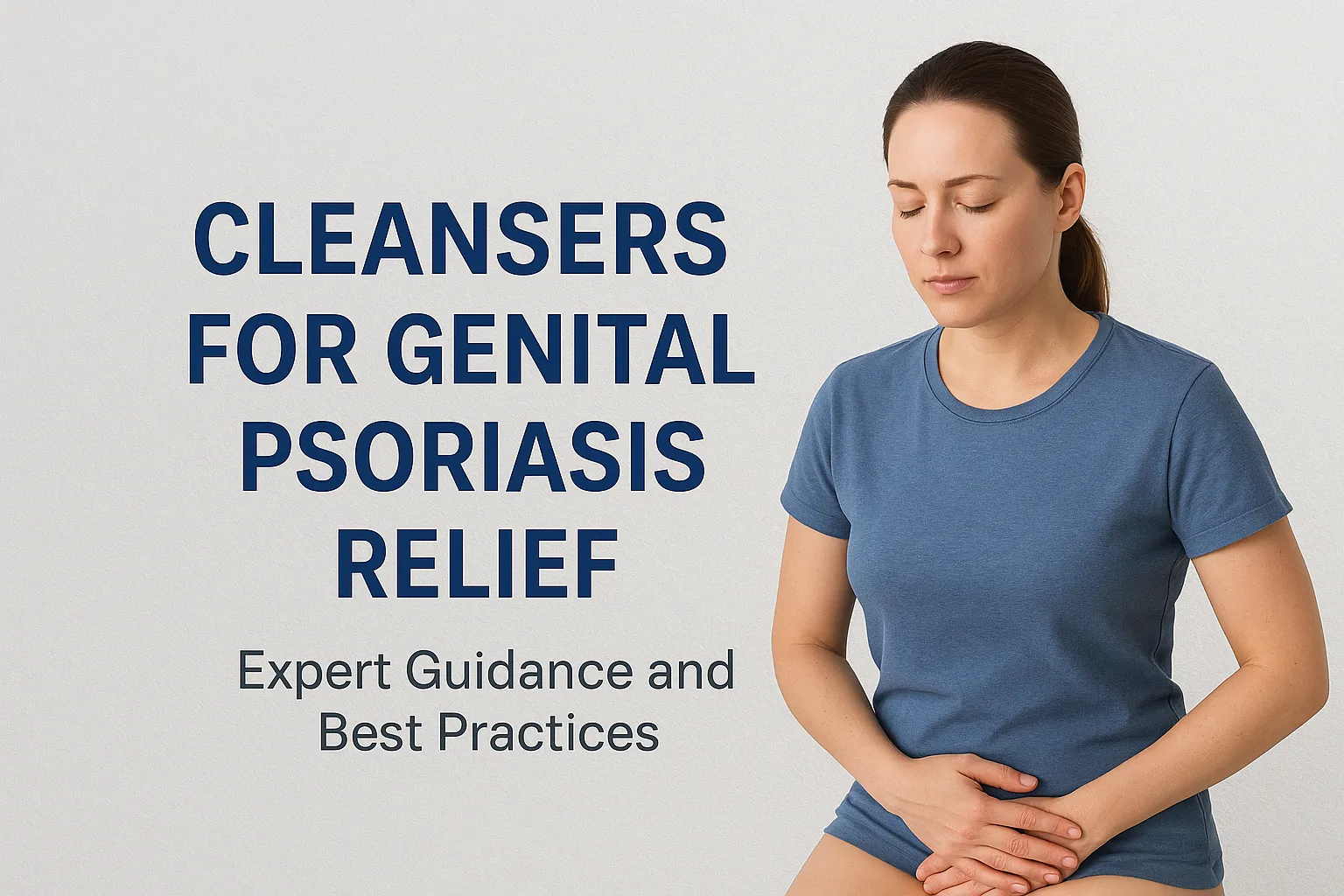Cleansers for Genital Psoriasis Relief: Expert Guidance and Best Practices

Understanding Genital Psoriasis Care
Genital psoriasis is a unique challenge for many individuals living with psoriasis, as the skin in the genital area is thinner, more sensitive, and prone to irritation. Unlike other areas of the body, the genital region requires special attention and a gentler approach to avoid exacerbating symptoms such as itching, burning, and discomfort. According to the American Academy of Dermatology, individuals with genital psoriasis should always inform their dermatologist about symptoms in this sensitive area, as treatment strategies often differ from those used on other parts of the body [4]. The primary goal is to minimize irritation, reduce symptoms, and maintain skin integrity while promoting healing.
Sensitive Skin Demands Gentle Solutions
The delicate nature of genital skin means that harsh or fragranced products can easily trigger flare-ups or worsen existing irritation. Dermatologists consistently recommend using mild, fragrance-free cleansers formulated specifically for sensitive skin. Deodorant, antibacterial, or heavily fragranced soaps and body washes are discouraged, as they can strip the skin of its natural oils and disrupt the protective barrier, leading to increased dryness and sensitivity [4]. Instead, look for cleansers labeled as hypoallergenic, soap-free, and moisturizing. These products are less likely to provoke a reaction and help maintain the skin's natural moisture balance, which is critical for managing psoriasis symptoms.
The Science Behind Skin-Friendly Cleansing
Effective cleansing for genital psoriasis involves more than just choosing a gentle product. It is important to understand the science behind why certain ingredients and formulations are preferred. Non-soap cleansers are favored because they do not disrupt the skin’s pH balance or strip away essential lipids. Ingredients such as ceramides, lactic acid, and salicylic acid are beneficial for psoriasis-prone skin. Ceramides help restore and maintain the skin barrier, while lactic acid provides mild exfoliation without causing microtears or irritation. Salicylic acid, in low concentrations, acts as a keratolytic agent, promoting the shedding of excess skin cells and reducing scaling [1]. Moisturizing agents like glycerin and urea further support hydration and comfort.
Research highlights that cleansers with these ingredients, when paired with suitable moisturizers, can help manage symptoms, reduce scaling, and prevent the recurrence of flares. However, it is important to note that overuse of exfoliating agents may increase sensitivity in the genital area, so moderation and dermatologist guidance are key [2].
Best Soaps for Genital Psoriasis: Bar vs. Body Wash
When selecting a cleanser, the choice between bar soap and body wash can impact comfort and effectiveness. Bar soaps tend to be more alkaline and may contain harsh detergents, making them less suitable for sensitive genital skin. Unless specifically formulated for sensitive or psoriasis-prone skin, traditional bar soaps should generally be avoided [1]. In contrast, many body washes are developed with milder surfactants and added moisturizers, offering a gentler cleansing experience. Look for body washes that are free from sulfates, parabens, and synthetic fragrances. Some brands offer liquid cleansers designed for sensitive or eczema-prone skin, which can also be suitable for genital psoriasis.
Ultimately, the best choice is one that leaves the skin feeling clean but not tight or dry, and does not trigger irritation. Patch testing a new product on a small area before full use is always recommended.
Recommended Best Cleansers for Genital Psoriasis
Several cleansers have been recognized by dermatologists and patient advocacy organizations for their suitability in managing psoriasis, including in sensitive areas like the genitals. Notably, the National Psoriasis Foundation has awarded its Seal of Recognition to products that are non-irritating and safe for use on sensitive skin [1]:
- CeraVe Psoriasis Cleanser: Contains 2% salicylic acid, lactic acid, ceramides, glycerin, and niacinamide. This combination helps exfoliate gently, restore the skin barrier, and maintain hydration. It is specifically designed for psoriasis-prone skin and is free from fragrances and harsh detergents [2].
- Cetaphil Restoraderm Soothing Wash: Originally formulated for atopic dermatitis but widely used by psoriasis patients, this cleanser is gentle, non-soap based, and helps soothe dry, irritated skin. It is fragrance-free and well tolerated by those with sensitive skin [1].
- Other gentle, non-soap cleansers: Products labeled as hypoallergenic and formulated for sensitive skin, such as certain Eucerin and Vanicream cleansers, may also be appropriate. Always check for the absence of fragrances, dyes, and sulfates.
It is advisable to consult with a dermatologist before introducing a new cleanser, especially for use in the genital area. They can provide personalized recommendations based on your skin’s specific needs and sensitivities.
Potential Challenges and Best Practices for Optimal Results
Caring for genital psoriasis involves more than just selecting the right cleanser. There are several challenges and best practices to keep in mind to achieve optimal results:
- Challenge: Increased Sensitivity
- Genital skin is highly sensitive and prone to irritation. Even gentle cleansers can cause discomfort if used too frequently or in excessive amounts. To mitigate this, use only a small amount of cleanser, rinse thoroughly with lukewarm water, and avoid scrubbing.
- Challenge: Risk of Overdrying
- Frequent washing or use of hot water can strip away natural oils, leading to dryness and worsening symptoms. Limit cleansing to once daily and always follow with a fragrance-free, gentle moisturizer recommended for sensitive skin.
- Challenge: Product Residue
- Residue from cleansers can irritate sensitive skin if not rinsed completely. Take extra care to thoroughly rinse all product from the area.
- Best Practice: Loose-Fitting Clothing
- After cleansing, wear loose-fitting, breathable clothing to minimize friction and allow the skin to heal [3].
- Best Practice: Moisturize Immediately
- Apply a dermatologist-recommended, fragrance-free moisturizer to the area after cleansing to lock in hydration and support barrier repair.
- Best Practice: Monitor for Irritation
- If you notice increased redness, pain, or new symptoms after using a cleanser, discontinue use and consult your healthcare provider.
Alternative approaches include using plain water for cleansing during flare-ups or when irritation is severe, and limiting the use of any cleanser until symptoms improve. In some cases, topical medications prescribed by a dermatologist may be necessary in conjunction with gentle cleansing routines.
Summary and Key Takeaways
Managing genital psoriasis requires a careful, informed approach to cleansing and skin care. Choose fragrance-free, non-soap cleansers with moisturizing and barrier-supporting ingredients. Always test new products on a small area, use minimal product, and follow up with gentle moisturizers. Consult a dermatologist for personalized advice, especially if symptoms persist or worsen. With the right routine, many individuals find significant relief and improved quality of life.
References
- [1] MyPsoriasisTeam (2025). Soap for Psoriasis: What Do Dermatologists Recommend?
- [2] CeraVe (2025). Cleanser for Psoriasis Treatment with Salicylic Acid
- [3] PMC (2018). Treatment of Genital Psoriasis: A Systematic Review
- [4] AAD (2025). How can I treat genital psoriasis?











